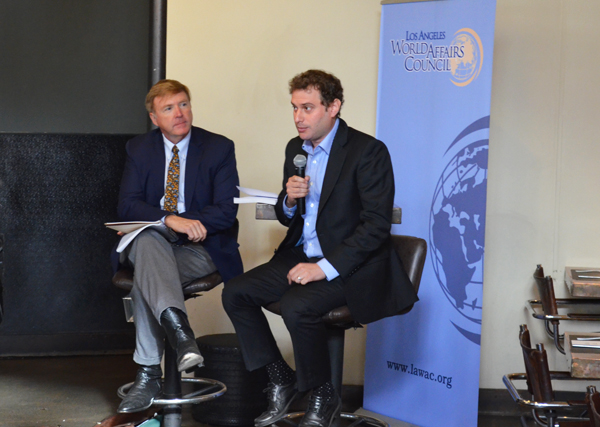 Justin Hughes, LMU law professor, moderates the discussion with Jonathan Lusthaus.
Justin Hughes, LMU law professor, moderates the discussion with Jonathan Lusthaus.
Part of what makes profit-driven cybercrime so successful is the anonymity of those committing the crimes. Jonathan Lusthaus, who spoke at a Global Cafe Breakfast on November 7th, has spent the last seven years researching these anonymous criminals to figure out who they are, what motivates them and how they operate. He has met with some of the world’s foremost cybercriminals in hotspots such as Russia, Ukraine, China, Nigeria and Brazil. Lusthaus was joined by Justin Hughes, LAWAC member and Hon. William Matthew Byrne Chair at Loyola Law School.
Cybercrime is a full-blown industry that operates via online marketplaces similar to eBay where products and services are exchanged. “I don’t think the singular role of cybercriminal exists anymore,” Lusthaus said. “It is an industry of many people who all have their own important role to play in a larger operation.” One of the main uses of the marketplaces is to rate and review others, which is one of the only ways for cybercriminals to develop trust between each other or gain respect.
A major barrier for thwarting cybercrime is the international nature of it. It’s incredibly difficult to locate the criminals and when officials do locate them, they have to work out an arrangement with the country’s government to extradite the person of interest. “Law enforcement will wait until cyber criminals will go on vacation,” Lusthaus explained. “That way they can have the time to work with the government in the country they will be visiting and arrange extradition beforehand.” In order to prevent future cyber attacks, he strongly urged governments to work together to establish cyber laws and improve cooperation between countries to make it easier to process these kinds of crimes.
Lusthaus is the Director of the Human Cybercriminal Project at Oxford University. His new book, Industry of Anonymity, is available for purchase here.
